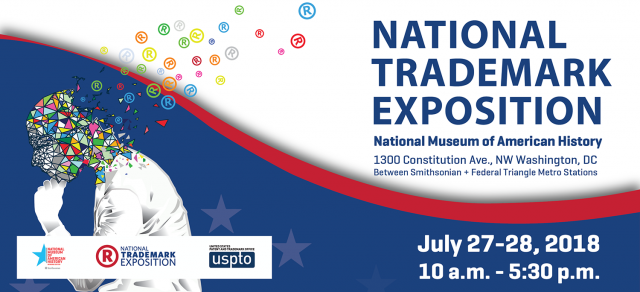I attended the U.S. Patent and Trademark Office's 2018 National Trademark Exposition, a free 2-day event held at the Smithsonian's National Museum of American History (home of famous artifacts like Abe Lincoln's Stovepipe Hat and Judy Garland's Ruby Slippers), July 27-28, 2018.
I was fortunate to be able to attain registration for the two free Continuing Legal Education (CLE) seminars.
The first CLE seminar, Who Owns You When You Are Dead?, was a revealing look at the not-widely-known-or-well-understood Right of Publicity, which can be particularly critical for tax implications and estate planning. The presenters discussed interesting examples involving the estates of Marilyn Monroe, Michael Jackson, Whitney Houston, and Prince--who, unfortunately, died without a will! Not a good idea!
Kareem Abdul-Jabbar, famed former NBA basketball player and best-selling author, spoke at the Opening Session, as well as USPTO leaders Andrei Iancu and Mary Boney Denison:
This session on Counterfeits and Cybercrime provided powerful examples of the impacts of counterfeit goods, such as defective airbags in cars and tainted medicines and drugs:
Brian Levine (speaking, in the above photo), Senior Counsel and National CHIP Coordinator with the U.S. Department of Justice's Criminal Division, mentioned that defective Apple iPhone chargers have caused fires and electrocutions:
The International Trademark Association (INTA) had a booth giving attendees a chance to try to discern the fake good from the genuine good produced by the brand owner.
In this pic, the counterfeit Uggs boot is...the one on the left (got that one correct!):
Interesting chat with several summer interns for NASA. NASA's Booth gave out these cool Inventor's Notebooks--with a great Thomas Edison quote on the back--and information on Open Source NASA Software and Patent licensing and use:
Displays by, in alphabetical order, the DC Roller Girls, Safeway, and Velcro:
I took a USPTO Trademark Examiner and a Trademark Attorney up on their offer to talk about soundmarks (e.g. the NBC chimes, MGM lion, Homer Simpson's D'Oh, and the Harlem Globetrotters theme), as well as smellmarks, like the recently registered smellmark for Playdoh.
The Mouseketeers cap, Coca Cola bottle, and Mrs. Butterworth's Maple Syrup bottle are memorable kinds of shapemarks:
A woman working the Girl Scouts display shared with me a humorous "teachable moment": a USPTO attorney at the Expo informed her that one of the Girl Scout exhibits (which another employee had created) mistakenly described Juliette Gordon Low's application filed for a 1913 patent when it was actually a trademark:
A lifelong aficionado of the U.S. National Park Service (NPS), thanks to many early trips with my family, I also visited their booth. This is their primary logo, the arrowhead:
This is their new "secondary logo", I was told:
And this is an example of the kinds of collaborations between the NPS and corporate partners:
My time at the 2018 National Trademark Expo was very informative and worthwhile. Metro got me around part of the time and I walked the rest--despite scooters, bikes, and cars ubiquitously available for rental:
And I also got to visit two great D.C. area bookstores, Politics and Prose (who had a booth at the Trademark Expo) and KramerBooks:




































